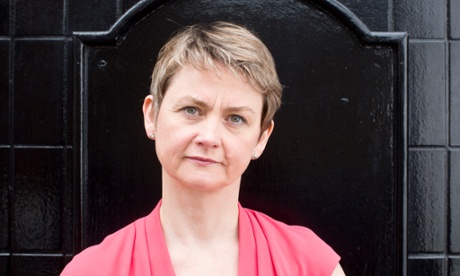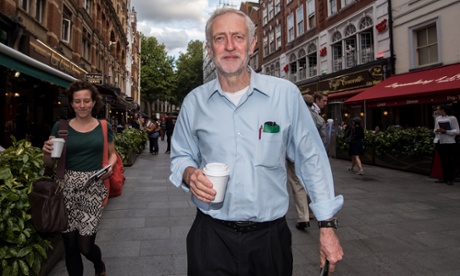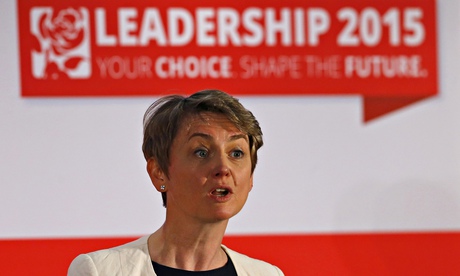It has been a difficult week to be a contender for the Labour leadership, and Yvette Cooper’s Thursday morning does not prove an exception to this rule. She has just come from a monstering in an interview with John Humphrys on the BBC Today programme in which he has effectively accused her of being bland, bloodless and banal. They are just the qualities, Humphrys implied, that are sending enervated Labour members towards the primary campaign colours of Jeremy Corbyn, a man whose chief previous experience of high public office was chairman of Haringey planning committee.
Still, if Cooper is upset or angry, she gives no hint. Instead, sitting in the showcase Golden Lane children’s centre in Islington, she is marvelling at the resources and modernity of the building. Inevitably, cuts threaten the future of such centres, one of the best legacies of the Labour government in which she served. The leadership contest is in part a contest over how best to protect such public services not just in the here and now, but also by regaining power. As she contemplates the course of the campaign, she is unrepentant.
And yet she speaks in code. Instead of branding Jeremy Corbyn as old Labour, Liz Kendall as Blairite, and Andy Burnham as Miliband mark two, she says: “We cannot go back to Michael Foot 1983, we cannot go back to the Blair-Brown era of 1997, and we cannot go back to Ed Miliband 2015. We need to set out a positive agenda for 2020.”
Which would be her agenda, of course. But if Cooper is the candidate for the next election, her critics say, she has not yet done enough to articulate what that plan looks like. Childcare, child poverty, a new contract with business and a digital economy have been her themes. Whatever the merits of these policies, there are those who would argue that they do not add up to a governing philosophy.
There has indeed been what you might call a “tea or coffee” aspect to the Cooper campaign. The suspicion is that if she was asked which of the two she would prefer, she might reply “it is a false choice”, or perhaps ask for a bit of both. Her critics say this is all quite deliberate. Her aim is to be so inoffensive that she becomes everyone’s second choice in the election contest, allowing her to win as the candidate that the party least dislike.
The risk of this approach is that, in a contest crying out for passion, her competence and experience might come to be seen as a disadvantage, or even begin to grate. Either way, it would not be much of a mandate, or launch pad, for four-and-a-half punishing years as leader of the opposition. But in the language of Phillip Blond, the Conservative thinker, her agenda does not amount to a “foundational philosophy or any transformative beliefs”.
This lack of definition is odd because Cooper is a hugely intelligent woman, as you would expect from someone who won a Kennedy scholarship to Harvard. Hers is a life and political career punctuated by firsts – a first in PPE at Oxford, the first female minister to take maternity leave, the first female treasury chief secretary, and now the ambition is to be the first female Labour leader and first Labour female prime minister. That, she says, is in itself worth being passionate about, not for herself, but for what it would say about the Labour party, until recently one of the most masculine institutions in British society.
That sense of “bloodlessness” also looks strange when she recalls the night that made this a difficult year, as well as a difficult week: 7 May. The political pain of a Labour defeat in the general election was accompanied by a more personal blow: the defeat of her husband, Ed Balls, in the Morley and Outwood constituency. Because her count finished early, she went home to watch the results unfold on television, feeling genuinely optimistic for a Labour victory.
Instead, she says: “It was miserable. Suddenly all those hopes come crashing down. Ed and I were talking on the phone all through the night so I knew Morley was looking bad. One of the toughest things was talking on the phone to the children – our oldest had her first GCSE that day – trying to stop them getting upset as they watched the headlines come through. But the thing about Ed is that he is so strong and also so generous. He gave a beautiful speech that had not just me, but I think half the Labour party across the country, in tears as we watched. As he said, it is raw democracy – and whilst it can feel brutal, it’s also something to be very proud of.” It was, perhaps, harder to find consolation in the national disaster. “In the end, sad as we felt on the night, it feels far sadder for all the people I feel we let down because Labour didn’t win.”
It is perhaps with that sense of failure that Cooper also says she understands the idealism of the young voters gathering around Corbyn. As a teenager, in a family not much engaged in party politics, she went on the People’s March for Jobs. Pretty well penniless, in 1992 she took a 36-hour Greyhound bus ride down to Little Rock, Arkansas, to volunteer for the Bill Clinton campaign, where she says she lived off baked potatoes, sweetcorn and bananas from a local farm and worked as a researcher on the campaign’s crime and health policies.
Nearly 25 years later, with those relatively carefree days supplanted by her attempt to guide both the Labour party out of crisis and small Islington children who are dangerously liberal with poster paint, Cooper insists that she “gets” the party’s current complex mood.
“There is a sense of trauma after the election. It has been devastating for the party, and also there is a fear of what five more years of opposition represents. Faced with those five years, people are asking, ‘Do I have to hand in all my principles?’ Look, I grew up in the 1980s, so I understand. We went on a lot of marches, we had a lot of placards and a lot of drums and we did a lot of angry protesting. But in the end, it is not enough to be angry at the world. If you are in the Labour party, we have a responsibility to change the world. We have to make sure that anger is channelled so we can change society and build coalitions of support for change.”
It is almost as if, as the party polarises, Cooper’s mission is to make sure the party’s ideological centre holds. As she talks, she is measured in delivery, to the point of earnest, a trait that contrasts with her private humour.
“It is easy to reach for extremes, but then to fail to change anything. Part of what is happening at the moment is that a false choice is being posed for Labour party members. It is as if the Labour party has, on the one hand, either to stand up for values and principles but so risk being in opposition for ever, or, on the other hand, ditch all its principles to get elected. It’s as if you have to accept George Osborne’s 40% cut in public spending, or pretend the debt and the deficit don’t exist.
“Faced with this choice between head and heart, people will choose their heart because that is why they got interested in politics in the first place. But in the end, if all you do is become a protest movement, you will be unable to deliver.” Surrounded by Gruffalo books, Lego and toddler’s tables, she gestures at what political power can help create. “We will never be in government capable of building the fantastic Sure Start centres that help change kids’ lives.”
Cooper acknowledges the party has been damaged by the row over how it should have responded to welfare reforms this week. She joined the majority of her colleagues in abstaining on second reading, after the party’s own motion rejecting the bill was defeated.
“It ended up being an unsuccessful compromise in an attempt to keep the party together, and it did not even achieve that, so we ended up in completely the wrong place.
“We cannot be in a situation where we set no principles, no set of alternative values and simply look as if we are signing up to the Tory plans. It means we end up leaving people very confused.” She promises to campaign to force the Tories to drop the plan for tax credits to be restricted to the first two children, pointing to the hard cases, such as victims of rape. “It is divisive, destructive and will leave people a lot worse off in work. I am one of three and I have three children.”
Some of her defence of the welfare state is very personal, as someone who out of the blue aged 24 suffered the chronic fatigue of ME, and found herself falling into the welfare state safety net. “I spent a year out of work. I hated it. I hated every minute of it. I kept on trying to go back to work, and just not being well enough to do so. I needed support for those 12 months, but if you had told me a year before that I would need to claim sickness benefit, I would never imagined it.”
Cooper insists she knows welfare was one of the reasons that voters recoiled from Labour, and denies she is the candidate least prepared to admit the party should have done more to reassure the electorateabout its plans to cut the deficit. She will not accept Labour had overspent in the 90s prior to the crash of 2007. Neither does she accept that Labour – and specifically her husband – should have set a date by which the current account deficit would be eliminated in this parliament.
So why did not voters not trust Labour on the economy? “The bigger challenge was to get all of us in the shadow cabinet to talk about about how we would make savings. We did not all of us talk about some of the areas where would take some difficult decisions, where we would make the savings and still do it in a balanced way.”
More broadly, Cooper criticises what was seen as hostility to business. After the election, she says, “we went to a CBI event and a businesswoman said: ‘You pushed me away. I felt like you did not want my vote. My staff felt the same.’”
“We cannot sound like we don’t care about private sector jobs,” she goes on. “Or like we don’t care about the self-employed, or we don’t care about people trying to set up their own businesses. We just did not have enough to say to these people.”
Much of the blame for that landed squarely at Ed Miliband’s feet. For her part, Cooper insists she is ready for the job, even though she has seen closeup the toll being opposition leader exacts. “I am not naive, and thought about it very seriously. I know it will be tough.”
She had thought of standing in 2010, and was encouraged to do so by her husband, but decided her children were too young. Even now, as one of them completes their GCSEs, she is anxious to protect them. “They did not choose their parents,” she says, and recalls that there have been “very intrusive” moments, such as when the press appeared outside the gates of her children’s school after it went into special measures.
And what about her husband? Would he intrude on her leadership? He had an impressive article in the FT this week setting out how the government should handle the EU referendum. She laughs, and slightly bridles, recalling that, at Little Rock, Bill Clinton wore a badge saying “I’m backing Hillary’s husband”. “I was elected before Ed to parliament,” she points out. “Funnily enough, I don’t think Ed was asked about all this when he was standing to be leader in 2010.” She promises if her election is announced at the party special conference on 12 September, Balls will not be rushing on stage to kiss her. “I have long thought the traditional role of the adoring spouse standing up there on the stage in heels is a little bit dated.”
It is when Cooper reflects on the sexism implicit in some of the campaign that she becomes animated. “We can’t go back to an old fashioned Labour party – not just back to the politics of the 80s but of the politics of the 50s – treating women as incapable of the top jobs, and a party led by two men.”
She warms to her theme. “It has been a startlingly retro campaign debate. Andy’s campaign seem to be calling for Liz and I to bow out and leave it to the boys, or suggesting that somehow women aren’t strong enough to do the top jobs. Liz has been asked about her weight, I’ve been asked – on Woman’s Hour of all places – about whether I can possibly do this job because of my husband, and any talk about me being a working mum has been used as a sexist way to divide Liz and I and criticise Liz for not having children.”
There is an intensity in Cooper’s words, as if she has found her voice and inner steel. The question is whether she can show it to the party, and to the country.
- This article was amended on 27 July 2015 to reinstate direct quotes that had been edited for grammatical reasons.











